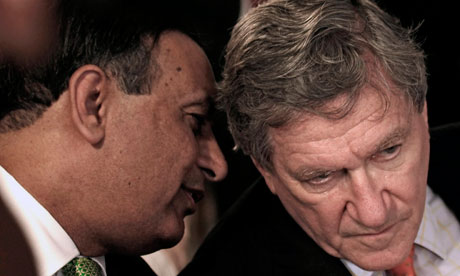Husain Haqqani offers to resign

high-profile ambassador to Washington has offered to resign, amid claims that he crafted an offer to US officials to rein in the Pakistani military and intelligence agency in the wake of Osama bin Laden's death.
In a tale of intrigue once again pitting Pakistan's weak civilian government against the military, an urgent letter was supposedly delivered in May to the then US military chief, Admiral Mike Mullen, from President Asif Ali Zardari, asking for help as he feared a coup after the US raid that killed the al-Qaida chief on 2 May.
Husain Haqqani, the US ambassador known for being an effective operator in Washington, warned on Thursday that the furore surrounding the letter was being exploited by the opponents of democracy in Pakistan. But he told the Guardian he had offered to resign in order to put an end to the controversy.
The prime minister, Yousuf Raza Gilani, told parliament this week that the ambassador had been recalled to Islamabad "to explain his position". Pakistan has been ruled by the military for half its existence and the elected government remains fragile. Some see the letter as a smear campaign by elements associated with the military.
A US-based Pakistani businessman, Mansoor Ijaz, had claimed that he delivered the missive, revealing its contents in an article in the Financial Times last month. He said that he had been asked to do so by a "senior Pakistani diplomat", which seemed to point strongly at Haqqani, a close aide of Zardari.
A spokesman for Mullen, who has just retired as chairman of the joint chiefs of staff, had this week confirmed a letter was received but added that Mullen "did not find it at all credible and took no note of it then or later".
Haqqani told the Guardian that he did not write or deliver the memo, but he said he offered to face an inquiry in order to put an end to the matter. "I do not want this non-issue of an insignificant memo written by a private individual and not considered credible by its lone recipient to undermine democracy," he said.
Pakistan's opposition has seized on the story. But, so far, there is no evidence that Zardari or his representatives authored the letter.
In the letter, Zardari offered to disband the notorious section S of Pakistan's Inter-Services Intelligence (ISI) spy agency in return for American support, according to Ijaz. This section is in charge of Afghan operations, including dealings with the Taliban and other Islamic militants.
US officials have repeatedly accused the ISI of secretly backing the Taliban and other insurgents, in Afghanistan.
Anti-Americanism in Pakistan reached new levels after a US special forces squad unilaterally entered the country to find and kill Bin Laden. The operation deeply embarrassed Pakistan's military, which condemned the operation as a breach of its territorial sovereignty.
Any suggestion that Zardari reached out to Washington, against Pakistan's own armed forces, is very wounding for his government.
Those close to Zardari believe the letter is being used to drive a wedge between the civilians and the military.
Many Pakistanis believe that the Zardari government, and the regime of General Pervez Musharraf before it, sold out its own interests to join Washington's "war on terror".
Such anti-American feeling is perhaps most acute in the military itself, which views Haqqani's access to the corridors of power in Washington with deep suspicion.
Given Haqqani's connections in Washington, it is unclear why he would choose Ijaz to deliver a message. Zardari's spokesman has accused Ijaz, who says he negotiated between the government of Sudan and the Clinton administration in the 1990s, of being a fantasist.
Husain Haqqani offers to resign
Nice info about pakistani politics. Nawaz Sharif Doom is on the way.
ReplyDelete